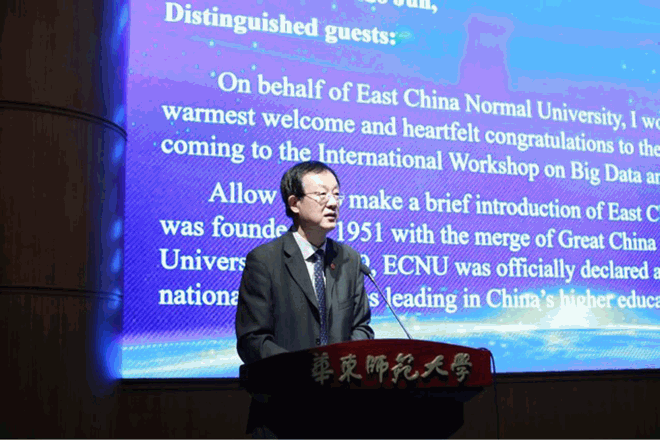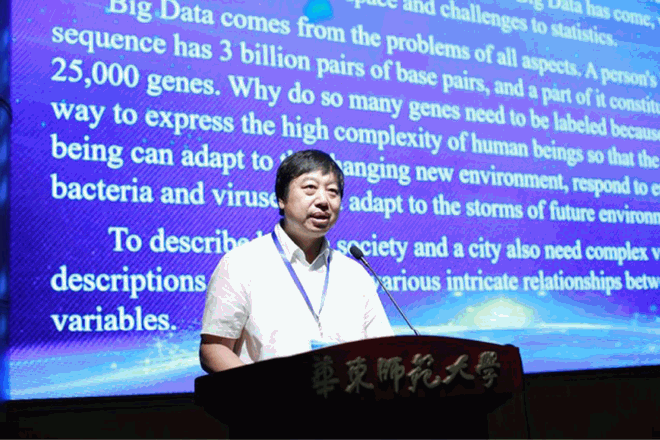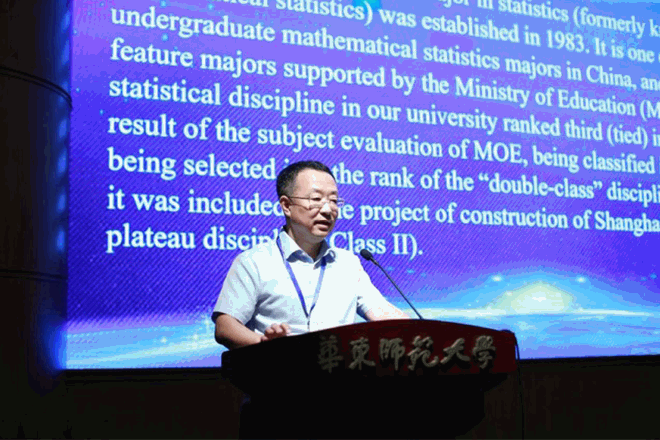Co-sponsored by East China Normal University (ECNU) and the Chinese Association for Applied Statistics (CAAS), the BDMS-2019 workshop was jointly hosted and organised by School of Statistics at ECNU, the Journal Statistical Theory and Related Fields (STARF), the Key Laboratory of Advanced Theory and Application in Statistics and Data Science-MOE (KLATASDS-MOE), and the Big Data Statistics Branch of CAAS.
The workshop was held at the Yifu Building in the Zhongbei Campus of ECNU, 22–23 June 2019, which attracted more than 150 statisticians, data scientists and research scholars from home and abroad. The opening ceremony was presided over by Professor Jun Shao of East China Normal University.
Professor Zhibin Li, Vice President of ECNU, made a welcome speech at the ceremony. He said that with the rapid development of digital information science and technology, massive data have been continuously generated and accumulated in many fields of human activities, and we have entered a new era of big data. Facing the opportunities and challenges in the new era, ECNU and CAAS have jointly established the new journal STARF and sponsored this workshop, aiming to actively promote the researches of statistical theory and their applications in related fields, and to construct international academic platforms for publishing and disseminating first-class research results, as well as a bridge and window for Chinese statisticians to the world.

Professor Zhibin Li, Vice President of ECNU, made a welcome speech at the opening ceremony
Professor Xiangzhong Fang, President of CAAS, expressed his congratulation on the opening of the workshop. He pointed out that data are the core and soul of statistics; the coming of the era of big data brings great development space and challenges to statistics. He expected that a range of interesting topics will be covered in the workshop.

Professor Xiangzhong Fang, President of CAAS, expressed his congratulation on the opening of BDMS-2019
In his welcome speech, Professor Riquan Zhang, Dean of the School of Statistics at ECNU, gave a brief account of the development of the statistics discipline at ECNU from the perspectives of historical evolution, existing teams, training systems, research directions, key laboratories, social services. He pointed with gratitude that every step of the development of the statistics discipline at ECNU is inseparable from strong supports of international and domestic counterparts, and hope they would continue to support it as always.

Professor Riquan Zhang, Dean of the School of Statistics at ECNU, addressed on the opening of BDMS-2019
At the end of the opening ceremony, Professor Jun Shao, also as Editor-in-Chief of Statistical Theory and Related Fields, gave a brief introduction of the new academic journal: Co-sponsored by ECNU and CAAS, and jointly published by ECNU and Taylor & Francis, the new journal was officially launched in August 2017. It aims to publish significant and original articles in modern statistical theory and related fields in natural, economical, medical, and social science. The emphasis is to meet the needs of statistical application and methodology development in a rapidly changing world and to promote the use of statistics in quantitative studies and interdisciplinary investigations. By the end of 2018, it has published two volumes and four issues, and published more than 50 papers. It will support international conferences in statistics: ‘BDMS-2019 is the first one!’ Professor Shao sincerely invites scholars at home and abroad to actively contribute and promote the development of STARF.

Professor Jun Shao gave a brief introduction of the new journal Statistical Theory and Related Fields
The Workshop consists of one keynote speech and 28 plenary reports that are classified into seven invited sessions. The keynote speech with title Translational Data Science was made by Professor Lee-Jen Wei from Harvard University.

Professor Lee-Jen Wei made a keynote speech titled Translational Data Science
The titles and speakers of plenary reports in each invited session are listed below:
Session I: Statistical Learning
Learning Finite Mixture Models by Minimum Wasserstein Distance Estimate
Jiahua Chen (Yunnan University, China; University of British Columbia, Canada)
Individualized Group Learning
Minge Xie (Rutgers University, USA)
Dynamic Demand and Supply Network Analysis for Ride Sharing Business
Hongtu Zhu (University of North Carolina, USA)
Statistical Learning of the Worst Regional Smog Extremes with Dynamic Conditional Modeling
Zhengjun Zhang (University of Wisconsin, USA)
Bayesian Analysis of a Covariance Matrix and Low Rank Learning
Dongchu Sun (University of Missouri, USA; East China Normal University, China)
A Bayesian Survival Model Based on Additive Regression Tree to Predict the Readmission Risk of Heart Failure Patients
Song Zhang (University of Texas Southwestern Medical Center, USA)
Bayesian Smoothing Spline Model and Its Application in Current Population Survey
Zhuoqiong He (University of Missouri, USA)
Bayesian Analysis of Bivariate Wiener Degradation Process
Ancha Xu (Zhejiang Gongshang University, China)
Simultaneous Confidence Bands for the Error Distribution Function in Nonparametric Regression
Suojin Wang (Texas A&M University, USA)
MaxICA with Augmented Genetic Algorithm and Application to EEG Data
Chunming Zhang (University of Wisconsin, USA)
On the Design of Experiments with Ordered Treatments
Ori Davidov (University of Haifa, Israel)
Measuring Clustering Strength of Networks via Normalized Clustering Coefficient
Bing-Yi Jing (Hong Kong University of Science & Technology; Hong Kong, China)
Robust and Efficient Estimation for the Treatment Effect in Causal Inference and Missing Data Problems
Huazhen Lin (Southwestern University of Finance and Economics, Chengdu, China)
Causal Inference with Many Covariates: A General Framework
Menggang Yu (University of Wisconsin, USA)
A Versatile Estimation Procedure without Estimating the Nonignorable Missingness Mechanism
Yanyuan Ma (The Pennsylvania State University, USA)
Efficient Quantile Regression Estimation and Variable Selection for Longitudinal Data with Nonignorable Dropouts
Lei Wang (Nankai University, China)
D-optimal Designs for the Heteroscedastic Berman’s Model on an Arc
Rongxian Yue (Shanghai Normal University, China)
A Functional Data Meta analysis Approach with Application to Infants’ Sleep Time
Xingyu Yan (East China Normal University, China)
A Non-randomized Multiple Testing Procedure for Large-scale Heterogeneous Discrete Hypotheses Based on Randomized Tests
Nan Lin (Washington University, USA)
Optimal Treatment Assignment of Multiple Treatments with Analysis of Variance Decomposition
Zhilan Lou (Zhejiang University of Finance and Economics, China)
Classified Mixed Logistic Model Prediction
Thuan Nguyen (Oregon Health & Science University, USA)
Integrative Linear Discriminant Analysis with Guaranteed Error Rate Improvement
Quefeng Li (University of North Carolina, USA)
Slow-kill for Big Data Learning
Yiyuan She (Florida State University, USA)
Optimal Insurance Strategies: A Hybrid Deep Learning Markov Chain Approximation Approach
Hailiang Yang (The University of Hongkong, China)
On High-dimensional Misspecified Mixed Model Analysis and Genome-wide Association Study: Variance Estimation and Big Data
Jiming Jiang (University of California, Davis, USA)
A New Look of Best Subset Selection for Sparse Ridge Regression from Chance-Constrained Programming
Xinwei Deng (Virginia Tech, USA)
Feature Screening for Ultrahigh Dimensional Categorical Data with Covariates Missing at Random
Lyu Ni (East China Normal University, China)
Variable Selection for Multiple Types of High-Dimensional Features with Missing Data
Danyu Lin (University of North Carolina, USA)
